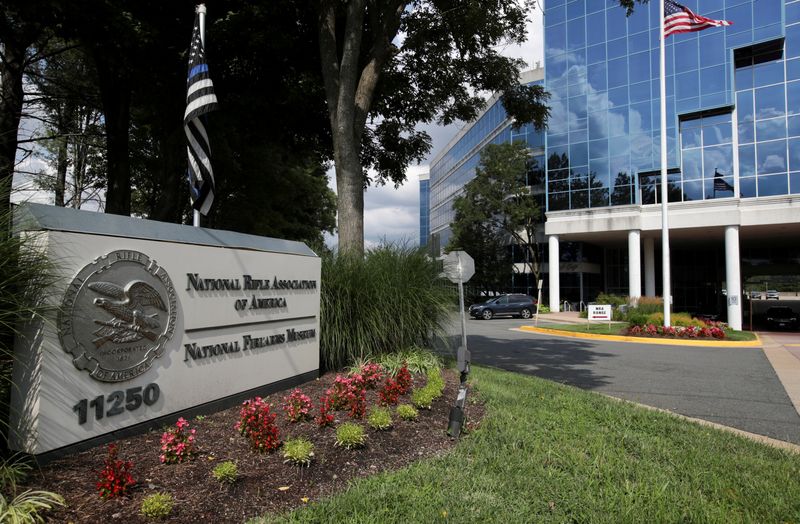By John Kruzel
WASHINGTON (Reuters) -The U.S. Supreme Court on Thursday revived the National Rifle Association’s lawsuit accusing a New York state official of coercing banks and insurers to avoid doing business with the gun rights group in a ruling that warned public officials against wielding their power to punish speech they dislike.
The justices, in a 9-0 decision authored by liberal Justice Sonia Sotomayor, threw out a lower court’s ruling that had dismissed the NRA’s 2018 lawsuit against Maria Vullo, a former superintendent of New York’s Department of Financial Services.
At issue is whether Vullo wielded her regulatory power to coerce New York financial institutions into cutting ties with the NRA in violation of protections under the U.S. Constitution’s First Amendment against government restrictions on free speech.
The NRA accused Vullo of unlawfully retaliating against it for its constitutionally protected gun rights advocacy by targeting it with an “implicit censorship regime” following a 2018 mass shooting in which 17 people were killed at a high school in Parkland, Florida.
“Ultimately, the critical takeaway is that the First Amendment prohibits government officials from wielding their power selectively to punish or suppress speech, directly or, as alleged here, through private intermediaries,” Sotomayor wrote.
The NRA, an influential lobby group closely aligned with Republicans, has opposed gun control measures favored by many Democrats and backed pivotal lawsuits that have widened U.S. gun rights. Its suit, seeking unspecified monetary damages, alleged that New York’s “blacklisting” campaign sought to deprive the NRA of basic financial services and threatened its advocacy work.
The case will now return to the lower courts for further analysis of the NRA’s allegations under the standard articulated in the Supreme Court’s ruling.
‘DISFAVORED POLITICAL GROUPS’
David Cole, a lawyer with the American Civil Liberties Union advocacy group that represented the NRA, said the ruling “confirms that government officials have no business using their regulatory authority to blacklist disfavored political groups.”
Vullo, who was appointed to her post by a Democratic governor, called upon banks and insurers to consider the “reputational risks” of doing business with gun rights groups following the Parkland shootings. In the aftermath of the Parkland rampage by a 19-year-old former student armed with an AR-15 rifle, NRA officials lashed out at gun control advocates, arguing that Democratic elites were politicizing the shootings to erode gun rights.
Vullo later fined Lloyd’s of London and two other insurers more than $13 million for offering an NRA-endorsed product called “Carry Guard” that Vullo’s office found was in violation of New York insurance law. The product provided liability coverage for policyholders who caused injuries from gunfire, even in cases involving the wrongful use of a firearm.
The insurers agreed to stop selling NRA-endorsed products that New York considered illegal.
The nonprofit group is organized under the laws of New York state, with its main offices in Virginia.
The case did not involve the Constitution’s Second Amendment right to keep and bear arms.
The Supreme Court heard arguments in the case in March.
A federal judge in 2021 dismissed all of the NRA’s claims apart from two free speech counts against Vullo. The Manhattan-based 2nd U.S. Circuit Court of Appeals in 2022 said those also should have been dismissed, prompting the NRA’s Supreme Court appeal.
Vullo was sued in both her official and personal capacities. But the 2nd Circuit found that Vullo would be protected from suit under the legal defense of qualified immunity that shields officials from civil litigation in certain circumstances.
Sotomayor in the ruling wrote that the 2nd Circuit “is free to revisit the qualified immunity question in light of this court’s opinion.”
Neal Katyal, a lawyer representing Vullo, expressed disappointment at the court’s decision but said that “we are confident Ms. Vullo’s claim of qualified immunity will be reaffirmed.”
The NRA found an unlikely ally in the case in President Joe Biden’s administration. Even though Biden has called gun violence a national embarrassment, his administration had urged the justices to let the NRA pursue its lawsuit.
The Supreme Court by the end of June is expected to issue rulings in two gun rights cases. One involves a challenge to the legality of a federal ban on “bump stock” devices that enable semiautomatic weapons to fire rapidly like machine guns. The other involves a challenge to the legality of a federal law that makes it a crime for people under domestic violence restraining orders to have guns.
